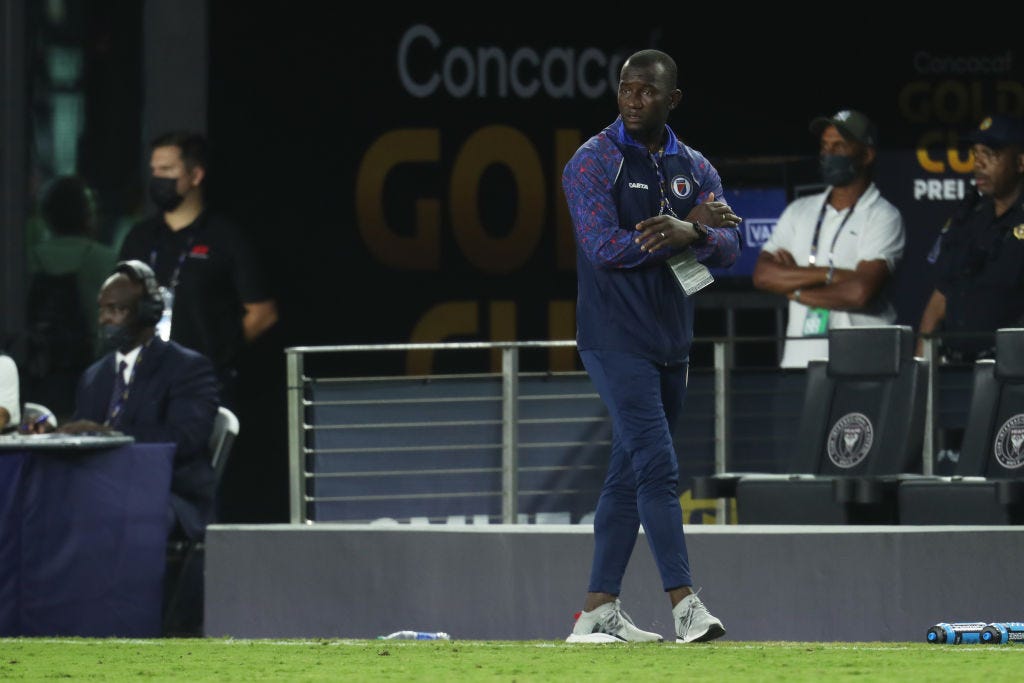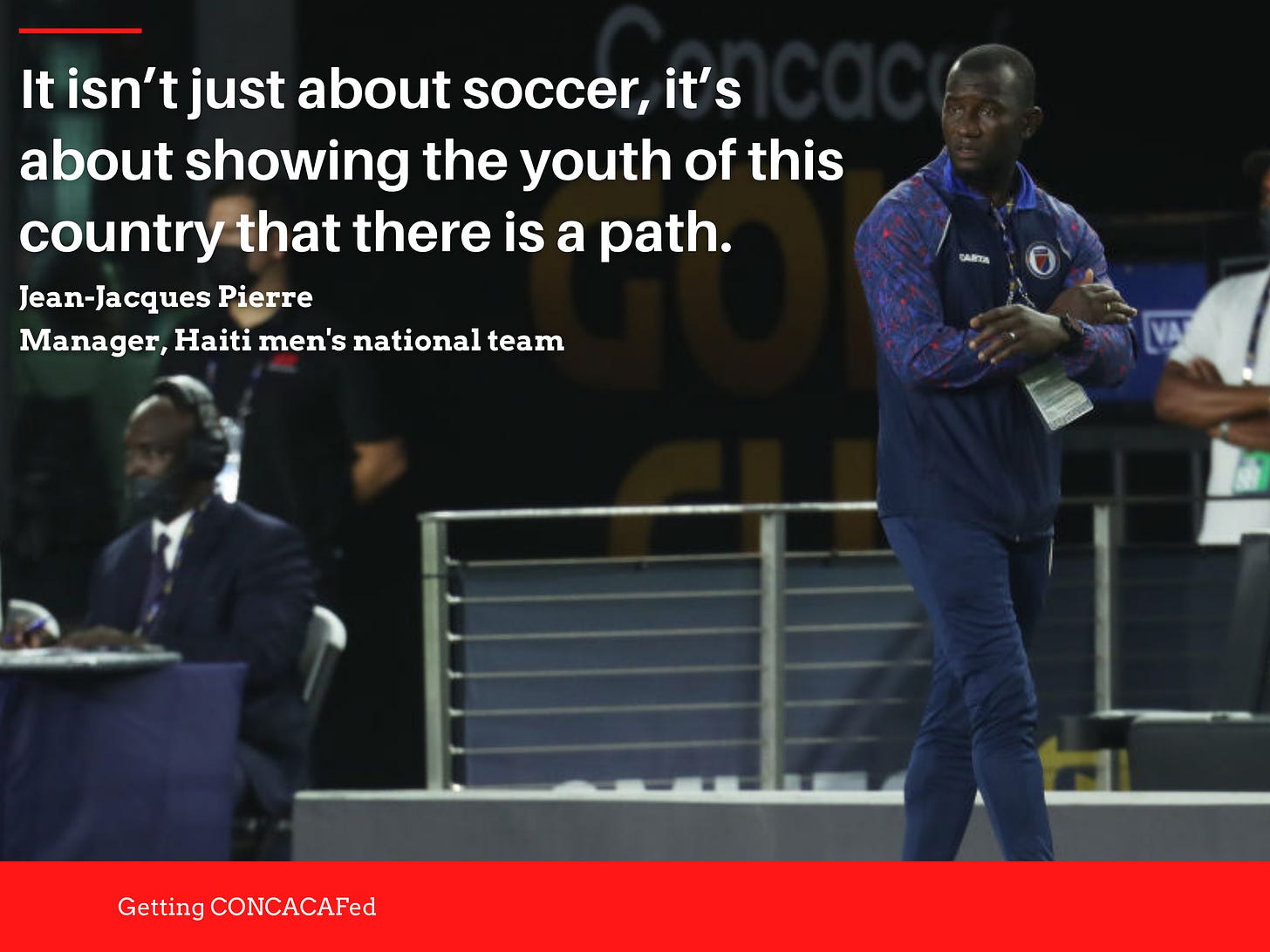🇭🇹 Jean-Jacques Pierre wants to give Haiti something to celebrate
How do you lead a national team when the country & the FA are struggling mightily?
Getting CONCACAFed is a newsletter sharing stories and analysis from the Concacaf region.
I write and report on stories other soccer outlets overlook from CCL, Nations League and more:
The headlines that come out of Haiti are bleak.
If you’re paying a little attention, you probably recall that the nation’s president was assassinated last year. Questions are still swirling about who did it and why.
If you’re watching more closely, you may have seen this week’s news that a diplomat from the Dominican Republic has been kidnapped, the latest incident in a chaotic, escalating gang war that has seen hundreds of Haitians driven out of their homes.
Dramatic sequesterings with big-money ransom demands like the cases of the Dominican diplomat or a group of missionaries from Ohio draw attention in the English-language press. But Haiti's Center for Analysis and Research on Human Rights says more than 1,000 Haitians were reported kidnapped in 2021, often in mass abductions carried out by a gang.
Things are hardly less chaotic and depressing in the soccer world. FIFA banned the head of the FA, Yves Jean-Bart, for life after finding he sexually abusing women and girls involved in the national team setup. The Belize squad was held at gunpoint by a group of armed bandits upon arrival for a World Cup qualification match last March.

This is the climate in which Jean-Jacques Pierre stepped into the job of managing the senior national team.
“I was the right person for the situation thanks to my knowledge of soccer and the players, but then Covid hit, then the incident with the president and we came into a federation that, well, they have three people instead of 15 who were there before,” Pierre told me on Zoom in Spanish (our shared second language). “You have to manage all these things to make sure development continues, and, at the same time, take the non-sport aspect out of a player’s head so he stays concentrated on the field.
“It’s very difficult."
The 41-year-old was one of the best players Haiti ever produced, leaving the Caribbean for Argentina and Uruguay, where he became a standout with Peñarol, before spending more than a decade in the top division in France.

But even after years as a fixture of national team’s back line, Pierre was a bit surprised to be leading the team into this World Cup qualification cycle.
Pierre originally expected to take on an assistant role and help keep youth national team standouts involved, with many from past generations that had success at the U-17 or other levels no longer involved in the sport. But another federation issue meant manager Marc Collat wasn’t going to continue, and Pierre stepped in.
He hopes the team can bring the nation moments of happiness and show kids in Haiti that there’s more in the world than struggle and frustration.
“Everyone who knows me knows I put my head in where others wouldn’t put their foot. Being on the field and having the chance to compete, to bring joy to the people of Haiti is something I can’t describe,” he said. “Having that shirt on, for me, it isn’t just about soccer, it’s about showing the youth of this country that there is a path, that opportunity exists.
“Even when we have all these problems, we still can do beautiful things.”
That’s what Haiti did in 2019, with an improbable run to the Gold Cup semifinals, toppling Canada in the quarterfinals and pushing Mexico to extra time in the semis. It sparked celebrations in Haiti and among diaspora communities in the U.S., France and elsewhere.
That remained the high point for the Grenadiers, however, unable to kick on in the Nations League and getting relegated in a group that also included Costa Rica and Curacao.
Organizational apathy and the pandemic meant it would be a full year and a half until Haiti’s next game, the WCQ against Belize.
In addition to the opponent being held at gunpoint, that game was an example of some of the frustrations the team has with the federation. Travel delays meant French-based players ended up arriving the day before the match (after staying in an airport hotel members of the coaching staff used their personal cards to pay for, Pierre said). They were tired, frustrated and not in optimum shape for a match.
Haiti still made it to the second round of WCQ, facing Canada in a two-legged series. The team again ran into administrative issues. Canada was playing its ‘home match’ in Chicago, and Covid restrictions at the time required travelers to leave Europe for a full 14 days before arriving in the U.S.
Several of Haiti’s France-based players couldn’t travel (but likely could have had administrators applied for the proper waivers or scheduled the travel more astutely) and ended up staying in Haiti as their teammates fell 3-0 to Canada for a 4-0 aggregate defeat that ended dreams of getting Haiti to the World Cup for the first time since 1974.
Some players still haven’t returned to the team, though Pierre said in our chat that the door is open for veterans like goalkeeper Johny Placide, midfielder Bryan Alceus and forward Frantzdy Pierrot, who haven’t been in the rotation continually since the 2021 Gold Cup, which Haiti saw marred by a Covid outbreak in the squad, or the WCQ snafu.

In fact, the door is open for nearly any Haitian player playing in a top league. With the domestic league suspended for a year and showing little signs of returning, the France-based Pierre is looking to convince eligible Ligue 1 players to suit up for the national team.
“I think because I was born in Haiti, I can be the bridge between those who are playing in Haiti and those playing here in Europe because I also know European soccer well,” he said. “Being born in Haiti, I’d say it was a chance for me. Leaving and coming into a historic team like Peñarol and making a mark is important, but you do that by working.”
It’s tough for young players in Haiti to work at the moment. Pierre said he and his staff would love to do two-week camps to identity and develop talent or set up trials using their connections abroad, but with the league not running and no youth leagues like in Europe and top Concacaf countries, the pathway to become a professional is filled with roadblocks.
Still, Pierre has his goals clear: He wants to get Haiti back into the top 80 of the FIFA rankings and enter the top seven in Concacaf (currently 90th in FIFA, Haiti has slipped to 10th in the region). And he wants to get Haiti back in League A of the Nations League.
“With respect to the teams in League B, we think that with what Haiti has done in the region, our place in in League A,” he said.
That looks like an achievable target, though Haiti is unlikely to play at home in the competition because of the political situation. The team was drawn alongside Bermuda, a squad it beat in the Gold Cup prelims, Guyana and Montserrat.
Something that Pierre hopes will help is more matches. Haiti played Guatemala in the March window but hasn’t taken full advantage of an international break since a pair of September friendly matches - a lopsided defeat to Bahrain and a win over Jordan. “We play too little for my taste,” the manager noted.
It’s just one of a number of improvements Pierre would like to see under the normalization committee: More games, easier travel, a connection between the youthgame and the senior level, the league restarting, training camps.
Yet, despite all those frustrations, he soldiers on.
“When you go into soccer in Haiti and want to do things well, you have to put your life, your personal things aside to be totally dedicated to soccer because you’ll find difficulty,” he said.
His focus now is on giving his countrymen going through the far more difficult things life brings something they can celebrate, if only for a moment.






This was a fantastic piece and I've always felt that Haiti could do better in football. It's unfortunate the state of the administration is what it is; but, of course... the state of the state as a whole is similar. Awesome journalism here
Yes, great piece. Shared with some other Haitians (we are a Haitian-American family) so hopefully will win you some new subscribers. ;). I am curious if you know of any means by which Haitians in the diaspora can support football in Haiti in an effective way (whether it is moral or monetary or perhaps making connection with other diaspora endeavors on the island in the areas of law and medicine in which they are involved?).